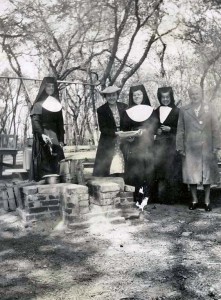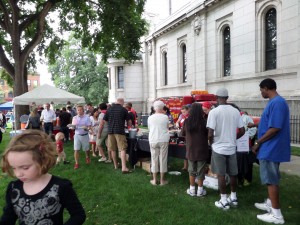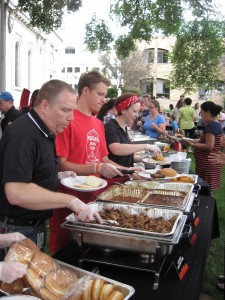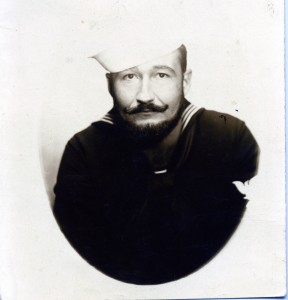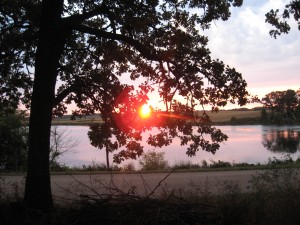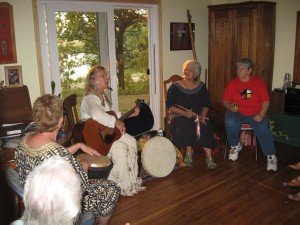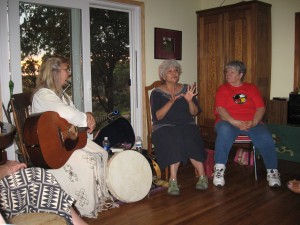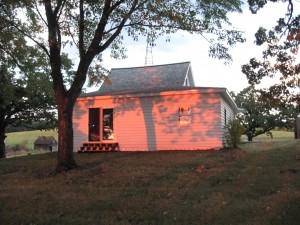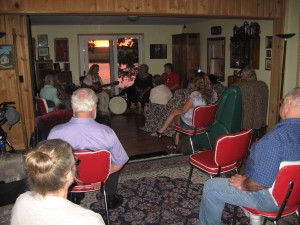#771 – Dick Bernard: Heritage. The Parish Picnic
NOTE TO SUBSCRIBERS AND FREQUENT VISITORS TO THIS SITE. PLEASE SEE NOTE AT THE END OF THIS POST.
Enroute to Mass at Basilica of St. Mary this morning, Cathy, my wife, told me that the annual parish picnic was today. That was news to me, though I usher at the Church. But they’re always fun.
Along the way we chatted about parish picnics we had known: me in rural North Dakota, and she in St. Paul.
They had common elements, these picnics: “potluck” meals (“bring a dish to share”), games for kids, and for adults, like the ever-popular cake walk; maybe somebody playing some music. “A good time was had by all” would be a usual and accurate descriptor.
I thought of one particular photo from my past: the only picture I know of from a parish picnic, at St. Elizabeth’s in Sykeston, North Dakota, probably from 1959, when the new Church was about completed. Here is the photo:
(click on photos to enlarge)
One of the ladies was holding, along with the Nun, something brought to the event. It could have been a cake. Something was heating in the pot. One of the ladies was wearing a hat – in those days, most of the ladies wore hats, all of them inside the Church, that’s for sure!
But the whole essence was community togetherness, relationship building over a hotdish, or a piece of cake or pie.
Cathy mentioned “Booyah”, something I never heard of out on the prairie but which is still a staple at big gatherings particularly in these parts of Minnesota and Wisconsin.
Some years ago I had occasion to look up the history of “Booyah”, and this is what I found. You’re never exactly sure what you’re going to get in a dish of Booyah, but it is likely to be pretty good!
Today’s event was more downtown big city, as one would expect at a major church on a major downtown Minneapolis street, but the principles are exactly the same. Get people together, often strangers (as we met today), and let people get to know each other over a casual meal.
For us, today, it meant meeting a young lawyer and Delta Air Lines ticketing agent and their three year old son who hailed from Louisiana and North Carolina respectively, and met in New Orleans several years ago, and now live in North Minneapolis. We had a great visit.
For us it was Famous Dave’s today, and not Booyah, but what difference does it make? It was a great time in the city!
NOTE TO SUBSCRIBERS AND OTHER VISITORS TO THIS BLOG:
As blogs go, mine is very active, varied, and probably fairly small in readership. But I am always surprised by now many people actually stop by, and particularly comment, on one topic or another. A recent example is the Syria post of September 3, which would mostly be seen at the time it is published, but to which later comments have been added. This happens frequently.
In addition, over the history of this blog, I have found myself quite without intending beginning informal series on a particular topic. For instance, this is at least the 8th post in recent years specifically relating to some aspect of “heritage”. A very major current issue for me is the situation with the Minnesota Orchestra. Etc.
With this post, I am going to work harder to connect blogs of like topics, and to simply suggest to everyone who is a reader to bookmark some topic in which they might have an interest, so that they can check back once in awhile to see if there are additional comments.
This blog began as an experiment. It has sufficient history now to be a bit better organized.
Here are some topics. If there are several posts on a topic, the post highlighted below is more-or-less the index blog, from which all other related posts are linked. There are a number of other series, but most of these are on issues which have come and gone.
Thanks for checking in.
Matters relating to French-Canadians and French in America (September 1, 2012, a starter site for a planned French-American Heritage Foundation website)
Heritage (Oct 5, 2011, 1st of several)
Mary Ann Mahers Peace Corps Experience in Vanuatu South Pacific (Nov. 10, 2012, a continuing blog of Mary Ann’s experiences)
Minnesota Orchestra Lock-Out (Aug 30, 2013, is anchor post. A major ongoing issue since October, 2012.)
On Growing Older, (May 5, 2013, and continuing in other posts.)
Remembering Sykeston ND (May 4, 2013, several posts linked from the original post)
United Nations Flag Issue at Hennepin Co MN (March 27, 2013, ongoing issue)
Valley City State Teachers College Memories late 1950s early 1960s (Jan 2, 2013, all related are linked within this post)

